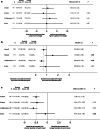Patients' Preference for Participation in Medical Decision-Making: Secondary Analysis of the BEDSIDE-OUTSIDE Trial
- PMID: 36085211
- PMCID: PMC10110786
- DOI: 10.1007/s11606-022-07775-z
Patients' Preference for Participation in Medical Decision-Making: Secondary Analysis of the BEDSIDE-OUTSIDE Trial
Abstract
Background: Patients may prefer different levels of involvement in decision-making regarding their medical care which may influence their medical knowledge.
Objective: We investigated associations of patients' decisional control preference (DCP) with their medical knowledge, ward round performance measures (e.g., duration, occurrence of sensitive topics), and perceived quality of care measures (e.g., trust in the healthcare team, satisfaction with hospital stay).
Design: This is a secondary analysis of a randomized controlled multicenter trial conducted between 2017 and 2019 at 3 Swiss teaching hospitals.
Participants: Adult patients that were hospitalized for inpatient care.
Main measures: The primary outcome was patients' subjective average knowledge of their medical care (rated on a visual analog scale from 0 to 100). We classified patients as active, collaborative, and passive according to the Control Preference Scale. Data collection was performed before, during, and after the ward round.
Key results: Among the 761 included patients, those with a passive DCP had a similar subjective average (mean ± SD) knowledge (81.3 ± 19.4 points) compared to patients with a collaborative DCP (78.7 ± 20.3 points) and active DCP (81.3 ± 21.5 points), p = 0.25. Regarding patients' trust in physicians and nurses, we found that patients with an active vs. passive DCP reported significantly less trust in physicians (adjusted difference, - 5.08 [95% CI, - 8.69 to - 1.48 points], p = 0.006) and in nurses (adjusted difference, - 3.41 [95% CI, - 6.51 to - 0.31 points], p = 0.031). Also, patients with an active vs. passive DCP were significantly less satisfied with their hospital stay (adjusted difference, - 7.17 [95% CI, - 11.01 to - 3.34 points], p < 0.001).
Conclusion: Patients with active DCP have lower trust in the healthcare team and lower overall satisfaction despite similar perceived medical knowledge. The knowledge of a patient's DCP may help to individualize patient-centered care. A personalized approach may improve the patient-physician relationship and increase patients' satisfaction with medical care.
Trial registration: ClinicalTrials.gov (NCT03210987).
Keywords: decision-making; decisional control preference; hospital medicine; quality of care; satisfaction.
© 2022. The Author(s).
Conflict of interest statement
The authors declare that they do not have a conflict of interest.
Figures

References
-
- Royal College of Physicians RCoN. Ward rounds in medicine: principles for best practice. 2015 (London: RCP, 2012.).
Publication types
MeSH terms
Associated data
LinkOut - more resources
Full Text Sources
Medical
Miscellaneous

